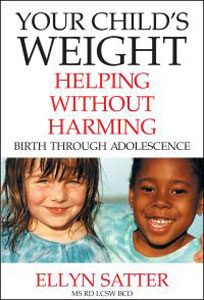

Family Meals Focus
The Ellyn Satter Institute Newsletter
The child on psychotropic medication
by Ellyn Satter, Registered Dietitian and Family Therapist
It hasn’t been proven that medications for anxiety and depression cause weight gain. However, the common assumption that they do could make you question your child’s ability to eat the right amount. Restricting your child will exacerbate any real or imagined tendency to gain weight on medication and create stress. Instead be scrupulous about following the division of responsibility in feeding.
Support parents in making an informed decision
You cannot give parents advice. You can give them information and let them make their own decision.
- Do you, the parent, continue to maintain a division of responsibility in feeding and keep your fingers crossed that your child’s eating and weight will equilibrate, even if at a higher level? In considering this option, be careful not to slip into the mindset that “if my child gets fat she will have poor self esteem and be even more anxious and depressed.” Children of all sizes feel good about themselves if parents feel good about them and raise them to be capable.1
- Or, do you (again, the parent) try to restrict your child’s food intake to keep her from gaining “too much” weight? Taking that path virtually guarantees that she will become food preoccupied, put pressure on eating, and be at a high risk of gaining even more weight than she would otherwise. That choice puts you in the role of being a police officer with food rather than a nurturing parent. Your policing and her not getting enough to eat will exacerbate her anxiety and/or depression.
Do an assessment
Weight gain on medication for anxiety and depression could be an urban rumor.
Keep in mind that you (the professional) could be dealing with a self-fulfilling prophecy: Parents are primed by those who prescribe medication to expect overeating, they restrict the child, and sure enough, the child becomes hungry all the time, unsatisfied when she eats, and prone to overeat. While weight gain may correlate with taking psychotropic medication, “Interference with fullness cues” secondary to many psychotropic medications could be an urban rumor. It may be true; for many medications, it has not been substantiated by studies. Don’t accept such assumptions. Instead, do a careful assessment of the child’s eating and growth history.2 Whether as a cause or effect of the child’s emotional problems, there have likely been and continue to be distortions in parenting and feeding. Based on your assessment, you can tell parents where they have room for improvement in feeding dynamics. You can offer to guide them in establishing positive feeding and in supporting their child in growing in a way that is right for her.3
Assess the child’s growth from birth
Do not make promises to parents, other professionals, or the child herself about the child’s weight. Instead, help them discover what holds true for the child. Reconstruct an accurate-as-possible record of the child’s growth. Your Child’s Weight: Helping without Harming talks about this.4 Has the child’s growth been consistent? Or do growth inconsistencies give clues to historical disruptions with feeding and in other areas? Perhaps she is currently recovering from poor appetite and growth faltering secondary to anxiety and/or depression so would naturally eat more and gain weight rapidly for a time.
Assess feeding dynamics from birth
Reconstruct an accurate-as-possible picture of feeding dynamics from birth. This also gives you clues to the psychosocial development. Child of Mine5 is best for this, also the table Developmental principles guiding feeding practices based on Child of Mine. Your review will tell you the child’s developmental stage with respect to eating competence and social and emotional development. If her attitudes about eating are negative and her food acceptance, food regulation, and mealtime skills poorly developed, you have some rebuilding to do. If, for instance, a preschooler, school-age child, or even adolescent behaves like a toddler with respect to eating and in all ways, her weight is the least of her problems.
Consider the child’s emotional health
The child’s being on medication indicates that parents and medical professionals consider it urgent and critical to treat her anxiety and/or depression and that medication is essential. That being the case, everyone may have to accept the child’s carrying a few extra pounds as the price of his emotional equilibrium.
References
1. Satter EM. Chapter 9, Teach your child: Be all you can be. Your Child’s Weight: Helping Without Harming. Madison, WI: Kelcy Press; 2005:291-322.
2. Satter EM. Appendix E, Assessment of Feeding/Growth Problems. Your Child’s Weight: Helping Without Harming. Madison, WI: Kelcy Press; 2005.
3. Satter EM. Appendix F, Treatment of Feeding/Growth Problems. Your Child’s Weight: Helping Without Harming. Madison, WI: Kelcy Press; 2005.
4. Satter EM. Chapter 10, Understand Your Child’s Growth. Your Child’s Weight: Helping Without Harming. Madison, WI: Kelcy Press; 2005:323-380.
5. Satter EM. Child of Mine; Feeding with Love and Good Sense. In: Satter EM, ed. Chapter 2, “Your child knows how to eat and grow”. Palo Alto, CA: Bull Publishing; 2000:31-76.
Explore
Help your child find out what holds true for her with respect to weight in Chapter 6, “Optimize feeding: Your adolescent,” in Your Child’s Weight: Helping Without Harming .
Address weight wisely and well
- Avoid restriction
- Children know how much they need to eat
- Follow Satter’s Division of Responsibility in Feeding (sDOR)
- Raise a healthy child who is a joy to feed
- The “overweight” child
Related issues of Family Meals Focus
- American Academy of Pediatrics (AAP) position statement, ”Lipid screening and cardiovascular disease in children”
- ARFID: What is it? What does it have to do with feeding dynamics and eating competence?
- Does the division of responsibility in feeding work in clinical care?
- Early infant weight gain, obesity, and adult disease
- Medication and the division of responsibility in feeding
- Setting the stage for telling parents assessment results

